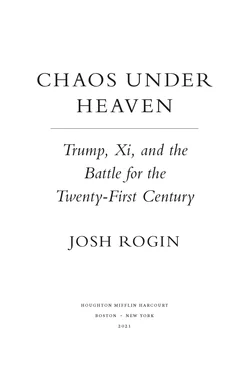In June 2018, Senator Marco Rubio and Congressman Jim Banks wrote to Education Secretary Betsy DeVos to demand she look into the fifty or so Huawei research centers located on American campuses. At the very least, they said, these universities should have to disclose the details of these arrangements, particularly when the federal government is involved in the research as well.
The Justice Department, in late 2018, began a huge program called the China Initiative, which brought together US attorneys from around the country to pool information and resources to get a handle on the vulnerability of American schools, research centers, and businesses to Chinese espionage and theft by “nontraditional collectors” of intelligence—that is, researchers. Part of their mission was to go around and educate academic institutions about threats to academic freedom posed by their hosting of these Chinese organizations.
The FBI and National Institutes of Health also began warning universities and research centers about CCP talent-recruitment plans, another major pipeline for research and technology theft. The CCP has established more than two hundred of these plans that pay leading scientists and entrepreneurs around the world to bring their expertise and technology to China. In many cases, the scientists are allowed to serve in place—covertly taking salaries from both China and America. As the FBI warned in 2015, these efforts allow the CCP “to acquire advanced technology without research costs.” In other words, Beijing uses these programs to reap the benefits of the billions of dollars the US government pumps into research and development. After looking into these efforts, the FBI soon uncovered dozens of cases of American researchers who had been recruited and paid by the Chinese government but didn’t tell anyone. If those researchers omitted that information from a federal grant application, they had committed a crime.
In April 2019, after a visit from the FBI, the MD Anderson Cancer Center in Houston fired three top scientists for not complying with center policies on disclosing their participation in the Thousand Talents Plan, the largest of over two hundred Chinese government programs to recruit Western scientists to work in China and to bring with them the secrets of their research. The scientists were never charged with any crime. Because they were ethnically Chinese, the incident raised concerns about racial profiling. But when the Moffitt Cancer Center in Tampa fired its CEO and five other researchers a few months later for hiding their Thousand Talent Plan affiliations, all but one were Caucasian.
By the end of 2019, the Education Department, Energy Department, and National Science Foundation had all banned their employees and grantees from participating in foreign talent-recruitment programs. The FBI program reached full speed. In December 2019, the FBI would arrest Chinese researcher Zheng Zaosong after he was caught with twenty-one vials of biological samples stolen from Boston University, hidden in a sock in his luggage; he subsequently would be charged with smuggling and making false statements. In January 2020, the chair of Harvard’s chemistry department would be arrested and charged with hiding his own paid participation in Thousand Talents.
How can scientific research, which is collaborative and open by nature, be such a valuable thing that the CCP is working so hard to steal it? Because some of the research in which China is interested is not publicly available; it is proprietary or being developed for government or military use. The interest in protecting those things is clear. Some of it is stolen for commercialization, giving Chinese companies a huge and unfair competitive advantage. More broadly, even if Americans believe in an open knowledge economy for the sake of elevating humankind, the CCP might not see it that way. China is exploiting the fact that Western scientists want to advance human knowledge, whereas China wants to dominate strategic and emerging technologies, wean itself off Western technology and research, and use those advantages to repress its people, influence the rest of the world, strengthen its economy, and arm its military.
The danger is even clearer in those cases where China has used these collaborations to help commit mass atrocities. As the reality of China’s expanding use of technology for the purpose of repression became clear, especially with regard to the Uyghurs, US universities were forced to examine whether they were making themselves complicit in these crimes against humanity. A top geneticist at Yale claimed ignorance when it was revealed in February 2019 that his collaboration with Chinese scientists was helping police in Xinjiang build a DNA database for Uyghurs without their consent. MIT had announced what was meant to be a five-year collaboration with Chinese artificial intelligence firm iFlytek in June 2018, but would cut ties in 2020 after reports accused the Chinese firm of selling technology to the government that is used to oppress Uyghurs. At the time of this writing, the University of Illinois at Urbana-Champaign is collaborating with the Chinese facial recognition firm CloudWalk, which is working to automate the detection and tracking of Uyghurs and Tibetans based on phenotypes—technology that can be used to track people with certain DNA types based on their physical appearance.
In mid-2020, the FBI began a sweep to find researchers in US academic institutions who had hidden their histories or affiliations with the Chinese military. This investigation would uncover disturbing examples of researchers affiliated with the People’s Liberation Army (PLA) who are working on sensitive topics including artificial intelligence, machine learning, supercomputers, and underwater robotics—all areas where the Chinese military is seeking a technological advantage over the United States. (When the State Department shut down China’s Houston consulate in July of that year, it was in part because it had been central to helping these researchers hide their true identities and evade US justice.)
The only way for Xi’s “China Dream” to come true is for America’s own values to wane. College campuses are but one of the many battlegrounds. Safeguarding free speech at universities is critical to the health of any democracy. Yet the US academic sector has struggled with defending two competing values—academic freedom and openness—at the same time. The national security and law enforcement communities struggle with two competing priorities as well: protecting the nation’s security while avoiding turning into the very repressive system they were opposing, by targeting people based on ethnicity or national origin. It had proved to be a vexing challenge—one made all the more difficult by the fact that it is far from the only one on these defenders’ plates.
Chips on Their Shoulders
When the Trump administration came into power, there were two big things happening in Silicon Valley. One was the global feeding frenzy to get ahead on artificial intelligence, which was beginning to take off. The other was a competition for engineers that was heating up because major US firms like Facebook, Amazon, and Google were growing faster than the schools could turn out graduates. China provided a way to success for American firms on both these fronts—much to the consternation of those in Washington who were trying to warn the tech industry of Beijing’s efforts to infiltrate their companies and exfiltrate their data.
The Chinese government was seriously investing in the technologies of the future, and Chinese universities were supplying skilled technicians to companies around the world. Inside US high-tech firms, there were national-security-minded people who were deeply wary and skeptical about China, but from a business perspective, cooperation made sense. The Chinese market of over seven hundred million internet users was too valuable to ignore.
Читать дальше











